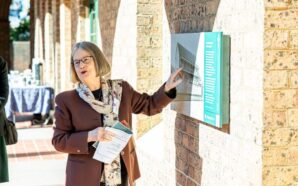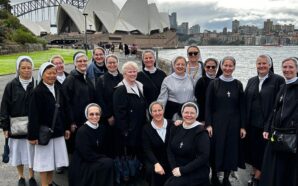Homily for the 4th Sunday in Ordinary Time
Readings: Jeremiah 1:4-5,17-19; Psalm 70; 1 Corinthians 12:31-13:13; Luke 4:21-30
30 January 2022
What a week!
On Monday we Catholics were treated to quite a shock. Archbishop Georg Ganswein, the long time secretary to Pope Emeritus Benedict, issued a statement admitting ‘a publishing mistake’ by Benedict who had previously claimed not to have attended an archdiocesan meeting in Munich in January 1980. At that time, 42 years ago, Joseph Ratzinger was the archbishop of Munich. At that fateful meeting, a decision was made to allow for the transfer to the diocese of a priest who was a child sex abuser. Initially the priest was to come to the diocese for treatment. But he ended up in a pastoral situation where he abused more children.
Listen at https://soundcloud.com/frank-brennan-6/homily-30-1-22
The shock was not so much that such a mistake was made 42 years ago. Many mistakes like that were made 42 years ago, and not just in the Catholic Church. The shock was the strength of Ratzinger’s denial and his attempt to downplay the mistake all these years later. When asked by the investigating lawyers whether he had participated in the meeting, Ratzinger not only replied, ‘I did not attend the archdiocesan meeting on 15.1.1980.’ He went on to explain, ‘As I still have an excellent memory of long-ago events, my statement must be understood to mean that I knew nothing about the matter.’[1] The offending priest had done appalling things in the presence of children, but all these years later Ratzinger (and/or his advisers) wrote in an 82 page written statement: ‘The priest was found to be an exhibitionist but not a perpetrator of abuse in the narrow sense.’ ‘Neither as priest nor as religion teacher did he act improperly in any way.’[2]
Both as a priest and as a religion teacher, and as an adult citizen, the priest had acted criminally and in a completely morally inappropriate fashion. If only after all these years, our esteemed retired pope could admit that he made a mistake, that he had learnt from his mistake, and that he would now unreservedly apologise for his error. How is it after all we have been through confronting the horror of child sexual abuse in our Church that one who has been pope could respond in this fashion? As Paul says to the Corinthians in today’s second reading, ‘Love delights in the truth; it is always ready to excuse, to trust, to hope, and to endure whatever comes.’
On Tuesday we Australians witnessed the standoff between last year’s Australian of the Year, Grace Tame, and our Prime Minister, Scott Morrison, at the entrance to the Lodge. No love lost there. Then, that evening we witnessed the acceptance speech by the paraplegic tennis player Dylan Alcott as this year’s Australian of the Year. We could feel the vibe between Grace and Dylan. Declaring, ‘Tame, you are fierce and I love it’, Dylan praised Grace for her advocacy before using humour to put us all at ease in relation to his disability. He said: ‘Standing ovations are one of the most ironic things in the world, by the way, but I’ll take them, without a doubt.’ He paid tribute to the disability advocates who had gone before him: ‘I also stand on the shoulders of giants, not literally, still can’t stand.’ He started life with self-loathing for his disability but in time those who loved and supported him helped him to see ‘that I was worthy and that I was allowed to be loved’. As Paul says to the Corinthians: ‘Love is always patient and kind: it is never jealous; love is never boastful or conceited; it is never rude or selfish; it does not take offence, and is not resentful.’
If you’re like me, you were both heartened and troubled when you heard Dylan giving thanks to the disability advocates and all those who had loved and supported him: ‘It’s because of them and everybody in my life that I sit here as a proud man with a disability tonight. I love my disability. It is the best thing that ever happened to me.’
I was not able to name my mixed feelings until I read these words of Dr George Taleporos, chairperson of the Victorian Disability Advisory Council, a few days later:[3]
I don’t want sympathy. I want people to understand that we can’t all “love our disability”. For me, there’s really not a lot to love. I hate it and always will.
Hating my disability doesn’t mean that I hate my life. I love my life and I feel proud of what I have achieved and of the work that I do. I feel proud of and love the disability community that I belong to.
So as we spend the next 12 months listening to Dylan and his inspiring, “feel-good” story, don’t forget there are many other stories that might not be quite as heart warming but that represent the daily reality of disability in its many forms. We can’t all love our disability. We don’t have to.
But what we all need to do is work towards a society where accessibility and inclusion are front and centre of social policy so that there is more to love and less to hate about being disabled.
I am grateful both to Dylan and to George. These issues, like many things in life, are complex and multi-faceted. Everyone’s experience is different. As Paul says to the Corinthians: ‘When I was a child, I used to talk like a child, and think like a child, and argue like a child, but now I am an adult, all childish ways are put behind me. Now we are seeing a dim reflection in a mirror; but then we shall be seeing face to face. The knowledge that I have now is imperfect; but then I shall know as fully as I am known.’ Individually and communally we can grow; we have grown; we see things as we did not see them before; and we will see things revealed in future which have been hidden from us individually, communally, and institutionally.
Throughout the week we have been treated to Ash Barty’s gracious passage to winning the Australian Open. In an interview after one of her wins, she said, ‘I love this tournament, I love coming out here and playing in Australia, and as an Aussie, we’re exceptionally spoiled that we’re a grand slam nation. We get to play in our backyard and I’m just happy that I get to play my best tennis here.’
It’s wholesome, it’s gracious, it’s understated, it’s earned; it’s sincere; and it’s real. In between such interviews we have been bombarded with Channel Nine’s advertisements for the appalling program Marriage at First Sight. Mind you, I have to confess never having watched it, and never wanting to. The show is promoted as ‘Australia’s most popular social experiment’ with couples being matched by relationship experts and a clinical sexologist before they meet for the first time on their wedding days when ‘they will jump straight into the deep end of their relationships by moving in together and facing a series of challenges that will test them like nothing they’ve experienced before’. As Paul tells the Corinthians: ‘If I have all the eloquence of men or of angels, but speak without love, I am simply a gong booming or a cymbal clashing….If I give away all that I possess, piece by piece, and if I even let them take my body to burn it, but am without love, it will do me no good whatever.’
At the end of a big week, there’s so much to call to mind affirming that ‘there are three things that last: faith, hope and love; and the greatest of these is love.’
I will sing of your salvation.
In you, O Lord, I take refuge;
let me never be put to shame.
In your justice rescue me, free me:
pay heed to me and save me.
I will sing of your salvation.
Be a rock where I can take refuge,
a mighty stronghold to save me;
for you are my rock, my stronghold.
Free me from the hand of the wicked.
I will sing of your salvation.
It is you, O Lord, who are my hope,
my trust, O Lord, since my youth.
On you I have leaned from my birth,
from my mother’s womb you have been my help.
I will sing of your salvation.
My lips will tell of your justice
and day by day of your help.
O God, you have taught me from my youth
and I proclaim your wonders still.
I will sing of your salvation.
[1] ‘What Benedict Knew…’, The Tablet, 29 January 2022, p. 7
[2] See https://www.wsj.com/articles/probe-blames-pope-benedict-xvi-for-failures-on-clerical-sex-abuse-as-archbishop-11642688550
[3] See https://www.theguardian.com/commentisfree/2022/jan/27/i-applaud-your-work-dylan-alcott-but-we-cant-all-love-our-disability
Fr Frank Brennan SJ is the Rector of Newman College, Melbourne, and the former CEO of Catholic Social Services Australia (CSSA). He has been appointed a peritus at the Fifth Plenary Council of the Australian Catholic Church.








